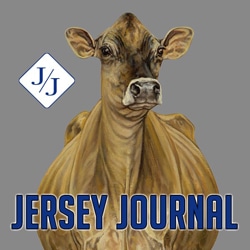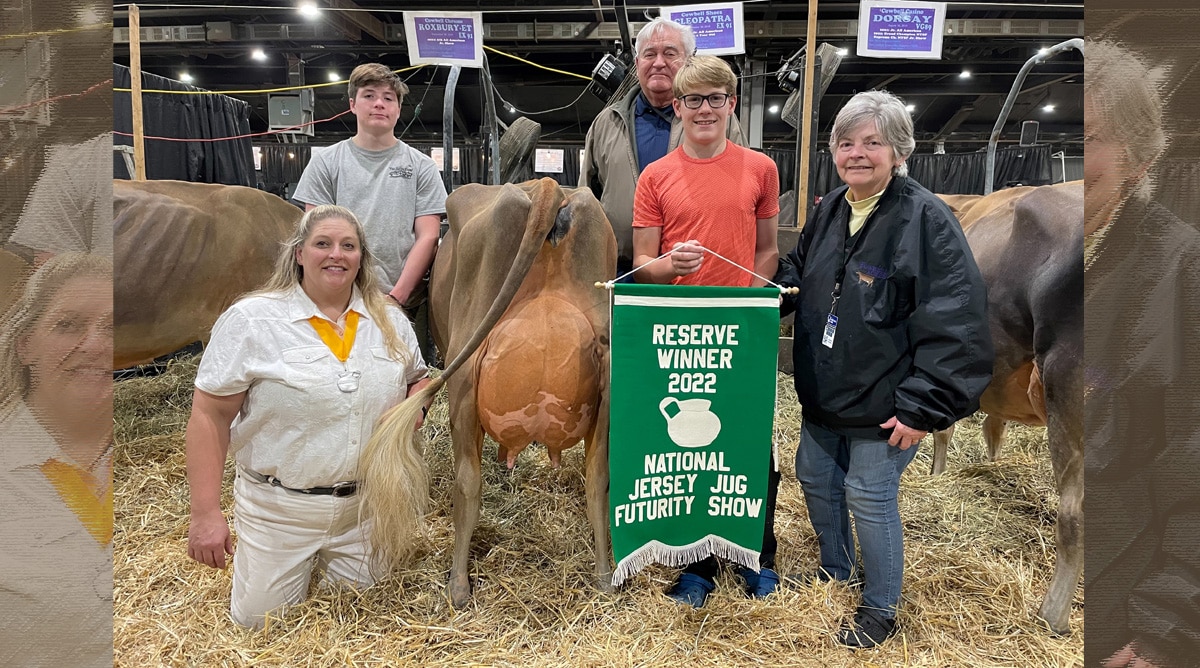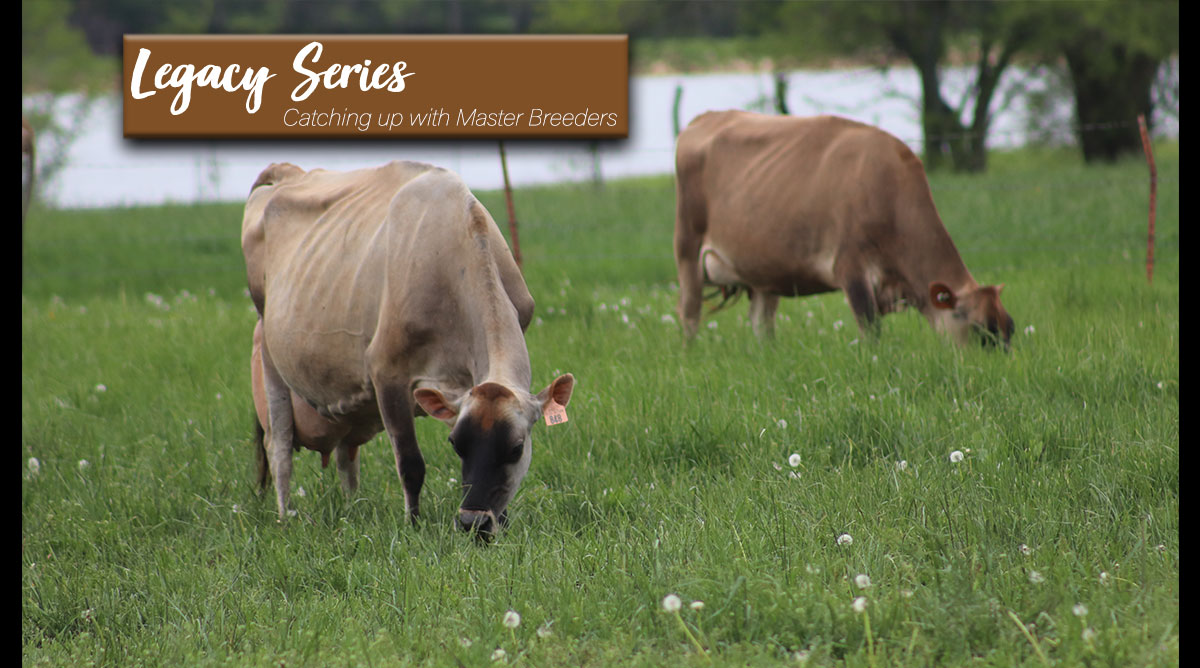Sheesleys Reap Rewards of Decades of Breeding at Cowbell Acres
If you travel the tanbark trail, you have likely noticed the name “Cowbell” appearing more and more often in the winner’s circle. Cowbell Acres is reaping the rewards of decades of selective breeding by Tracy and Carol Sheesley and their daughter, Christine Sheesley-Rozler. Christine’s 15-year-old twins, Graham and Chase, also help to operate the 110-acre, 20-cow Registered Jersey farm in the northwest corner of the state, 65 miles south of Ottawa.
The Sheesleys have set their hearts on an even loftier prize: breeding a National Jersey Jug Winner and a National Grand Champion. The aspiration is certainly within their grasp. Cowbell Shoes Cleopatra was just named Reserve Winner of the 2022 National Jersey Jug Futurity. Last year, Chase brought home the Premier Breeder banner from the All American Junior Jersey Show. And, in 2015, Cowbell Acres Guapo Ricochet was Junior National Grand Champion for Ben Sauder of Tremont, Ill.
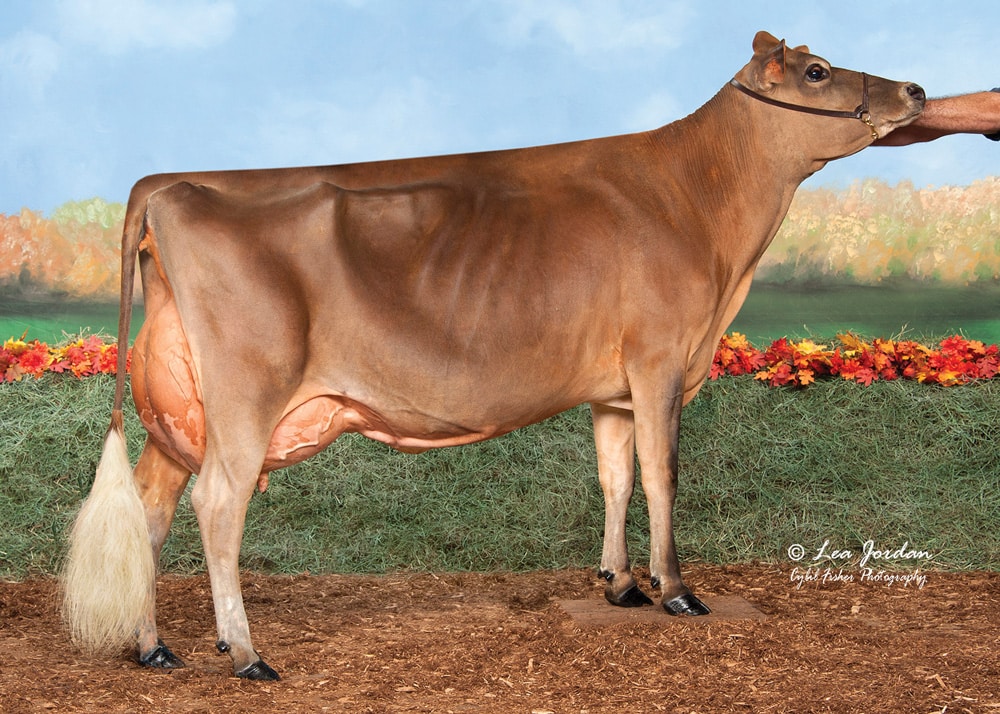
Though the herd is small, it is mighty, with a solid base on which to breed. The milking string includes 19 Excellents and three Very Goods and has an average final score that ranks among the best in the country at 91%. Two matriarchs are Excellent-94% and another five are Excellent-93%, including “Cleopatra.” Most are backed by multiple generations of Excellent or Very Good dams.
“Though we want cows that look good in the show ring, they also need to do their jobs at home—put milk in the tank,” noted Christine.
Fortunately, this task has been easier in recent years, according to Christine. “The Jersey breed has made tremendous strides for both type and production. In the modern Jersey cow, the two go hand in hand. If a cow isn’t dairy and doesn’t have a quality udder, she isn’t going to do well in the show ring or on the farm.”
The Sheesleys use REAP to manage the herd. Cowbell Acres has a 2021 lactation average of 18,995 lbs. milk, 859 lbs. fat and 664 lbs. protein.
In the Beginning
Like many who are milking Jerseys today, the brown cow got her step in the door as a 4-H project for a Holstein kid. In this case, it was Carol, who grew up caring for her family’s grade Holstein herd but chose to show a Jersey at the county fair.
The Jersey won her heart, so when she and Tracy purchased a 23-acre farm in 1970, they established the dairy herd at Cowbell Acres with Jerseys. Both held full-time jobs off the farm—she as a legal secretary and he as a state trooper—but worked diligently to grow their “hobby” in their free time. They started shipping milk in 1983 and expanded the barn and installed a pipeline in 1986. At that point, they were milking 24 cows and getting a hand with chores and the show string from their children, Timothy and Christine, who was crowned National Jersey Queen in 1989.
The first day of March 1996 was an eventful one for Cowbell Acres. The barn caught fire during chores and burned to the ground. Fortunately, most of the herd escaped and was milked and housed for four months at a nearby facility that lay empty. The Sheesleys moved the herd to the current farm in Canton, previously owned by Carol’s aunt and uncle, in July 1996. They renovated the existing barn and now house cows in 32 tie stalls and milk with a pipeline system. They raise calves in a barn with 10 individual pens of varying sizes that can be adjusted by moving their hog panel sides.
“Though I went to college, helped Piedmont Jerseys in Quebec with their show string, and graduated from the police academy in Albany, I never really left home, and the cows always came first,” said Christine.
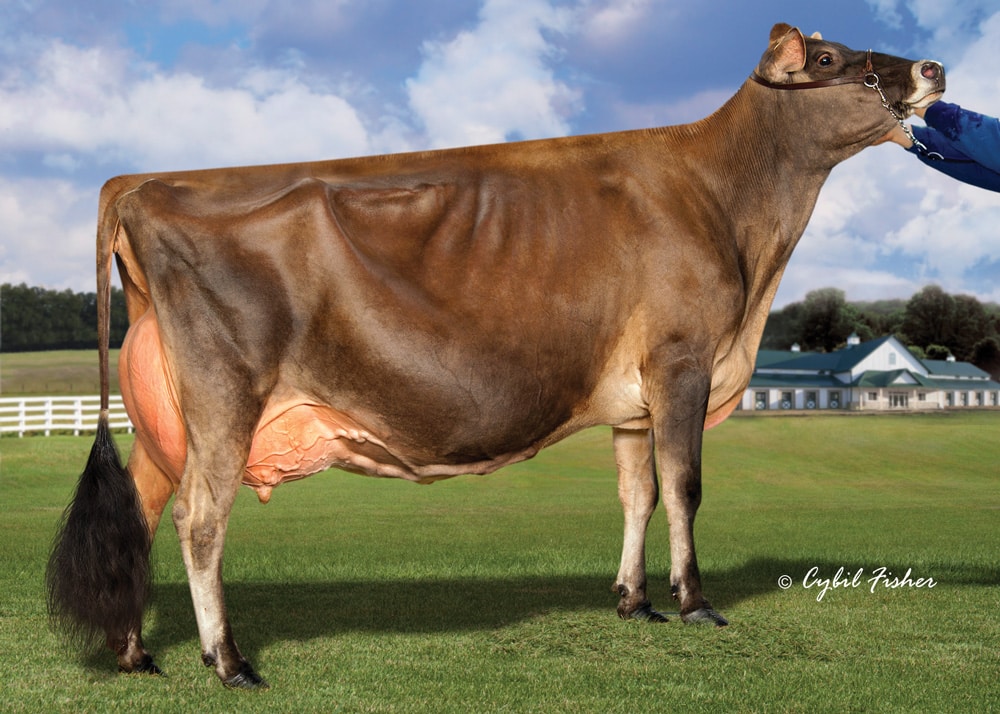
She attended college at the Morrisville and Potsdam locations for the State University of New York, where she earned an associate degree in animal science, and then got an undergraduate degree in English literature from St. Lawrence University in 1995. She graduated from the police academy in January 1996 and followed in the footsteps of her father as a state trooper, first stationed in Stormville and then in Canton. She retired with 20 years of service in May 2016 and then began working full time at Cowbell Acres.
Until recently, Christine and Carol teamed to milk, feed, and care for the cows, heifers, and two head of Jersey-Wagyu crosses raised for beef. With Carol’s spinal surgery in November, Christine now handles the bulk of the cattle chores with some hired help. Since he retired in 1991 (with 23 years of service), Tracy does most of the outside tractor work.
Four Foundation Purchases
Every animal in the Cowbell Acres herd traces to one of four foundation cows. The first was Masterman Jester Sabrina, purchased as a four-year-old in 1976 for $675 from Heaven Hill Farm of Lake Placid, N.Y. She had six daughters and a son and was appraised Very Good-86%.
“Sabrina” is in both the maternal and paternal lineage of the futurity standout, “Cleopatra,” who is sired by Cowbell Blue Suede Shoes, a homebred bull sired by Arethusa Verbatim Response-ET and out of Cowbell Guapo Sneakers, Excellent-91%. “Sabrina” is the eighth dam of “Cleopatra” and the ninth dam of “Sneakers.”
“Sneakers” is a show standout in her own right. She was Reserve All American Milking Yearling in 2010 and Grand Champion of the New York State—a first for the family—in 2011.
The Sheesley family brought home their second Grand Champion banner from the New York State Fair the next year, in 2012, with “Cleopatra’s” grandam, Cowbell Redwood Charity, who is also the family’s first homebred cow to be appraised Excellent-94%.
The second foundation purchase was Faithful Dee-Ann of SSF, from the Luchsingers of Silver Spring Farm, Syracuse, N.Y., in 1985.
“Though it is really hard to pick an all-time favorite, ‘Dee-Ann’ is right up there,” noted Christine. “I won Junior National Junior Champion honors with her in 1985 and took third in the Jug in 1988.”
“On top of that, she may have had the best personality of any cow we’ve owned. Mom remembers the day the barn caught fire and she saw ‘Dee-Ann’ escape danger and shepherd a pair of baby calves through the snow and pastures to safety in the woods.”
“She was quite the cow. She comes from the ‘Betty’ family at Marlu, which traces to a cow that spent nine months in Queen Victoria’s herd before she was exported. ‘Dee-Ann’ lived well past 11 years-of-age, was appraised 90 points, and had six daughters.”
Two favorites in the herd today from this cow family are Cowbell Casino Dorsay, Excellent-91%, and Cowbell Dragon Reckless, Excellent-94%. Last year, “Dorsay” was Junior All American Junior Two-Year-Old. At the Junior All American Jersey Show this year, she was Best Bred Owned and placed second in the junior three-year-old class. She was Supreme Champion of the junior show at the New York State Fair and Grand Champion of the open show. Chase also won the Schirm-Fremstad Award as the highest-placing junior in the Jug. “Reckless” was third in the Jug in 2020 and third four-year-old in the junior show for Graham in 2021.
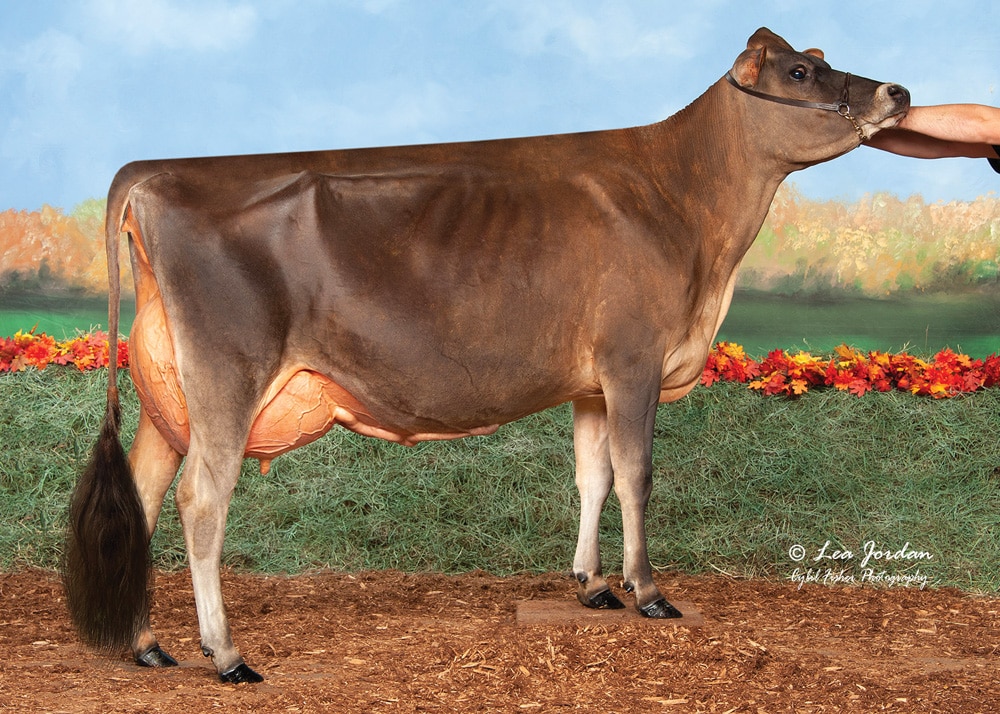
“Though they boys have done well with them in the show ring, they are easy keepers with awesome personalities, like their predecessor,” Christine stated.
The matriarch of the “M” cow family is Smithland Social Moose, purchased as a two-year-old from Marva K. Smith of Canastota, N.Y., in 1985.
The most recent foundation purchase, Rapid Bay Fatal Getaway Rich, is still in the herd today. The 10-year-old is the other cow appraised Excellent-94%. She was purchased from her breeders, Stephen and Janet Borland, Ormstown, Que., as a consignment to the Celebration of a Century at Silver Spring Farm in July 2014.
While the family has done well in the show ring on the halter of their own animals, numerous other animals that carry the Cowbell Acres prefix have done equally well for their new owners. Among the most well-known is the previously mentioned “Ricochet.” From the “Dee-Ann” family, she was Reserve Senior Champion at the All American Jersey Show in 2012 and Reserve All American Aged Cow in 2015 and 2017. She has 35 registered progeny, many marketed in elite sales by River Valley Farm.
Making the Most with What They Have
Many management decisions at Cowbell Acres are based on limited barn space, lots of manual labor, and less than desirable land.
But as the saying goes: when you are gifted lemons, make lemonade. The family’s lemons are heavy, clay ground that has been officially deemed as wetlands by the Environmental Protection Agency. Though much of the farm’s land is unsuitable for crops, it is perfect for solar panels—the family’s lemonade. Sol America recently signed a 25-year lease and a 40-acre field that was native grass last summer will soon harness solar energy.
“This allows us to purchase much better feed than we could ever grow on that field,” said Christine.
On the balance of the acreage, the family pastures cows and grows as much grass as possible for dry hay. They hire a friend to put up and wrap round bales and purchase some square bales as well.
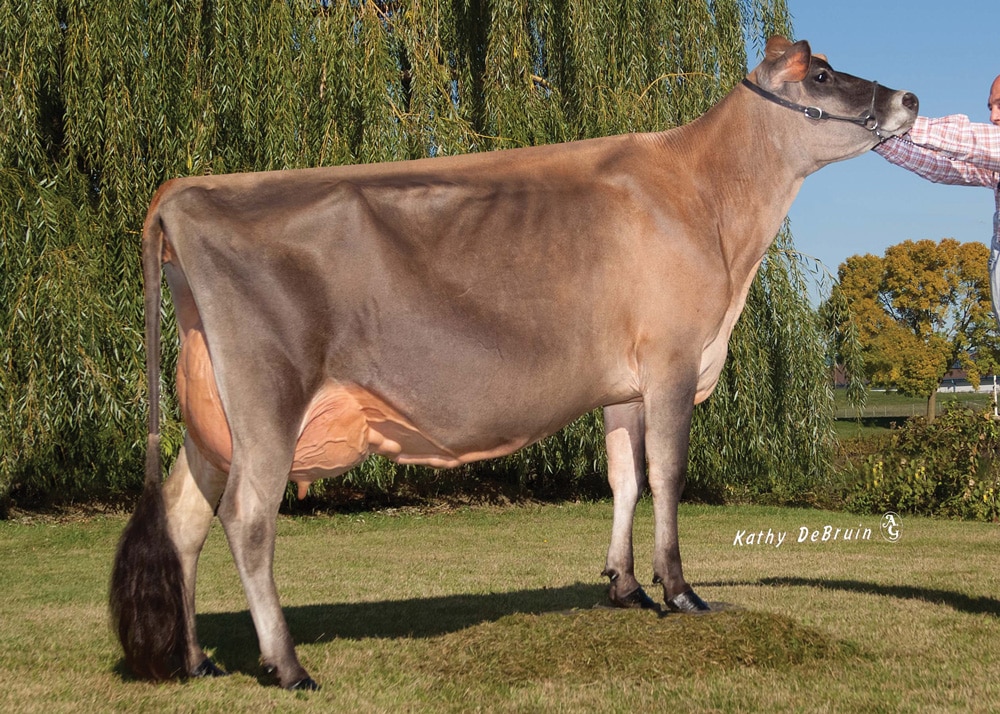
“We gave up trying to grow corn silage here several years ago and wondered if we would be able to get milk without it,” commented Christine. “But the cows didn’t miss a beat. We now supplement the hay with grain and top dress with corn meal. After all, cows are ruminant grazers and meant to be on grass.”
The Rewards
Anyone who has worked with cows in a tie stall barn knows it is labor intensive and back breaking. What makes the effort worthwhile? What makes the Sheesleys excited about heading to the barn every morning? There is nothing like the site of a row of freshly bedded, cud-chewing, beautiful-uddered bovines that you have developed on your own over decades. Nothing rivals the feeling of standing in the spotlight at the halter of a cow whose great-great-great grandma you bottle fed.
“The opportunity to watch new life unfold is another reward for the hard work,” summed Christine. “Every calf born brings with her or him the excitement and potential of the next generation. Seeing the new babies never gets old.”
“When I have a rough day, a quick walk through the calf barn gives me inner peace and helps me refocus on what is important.”
“I’m also a huge fan of the dairy cow herself and the milk she produces. I mean, is there anything more delicious than a nice cold glass of Jersey milk?”
